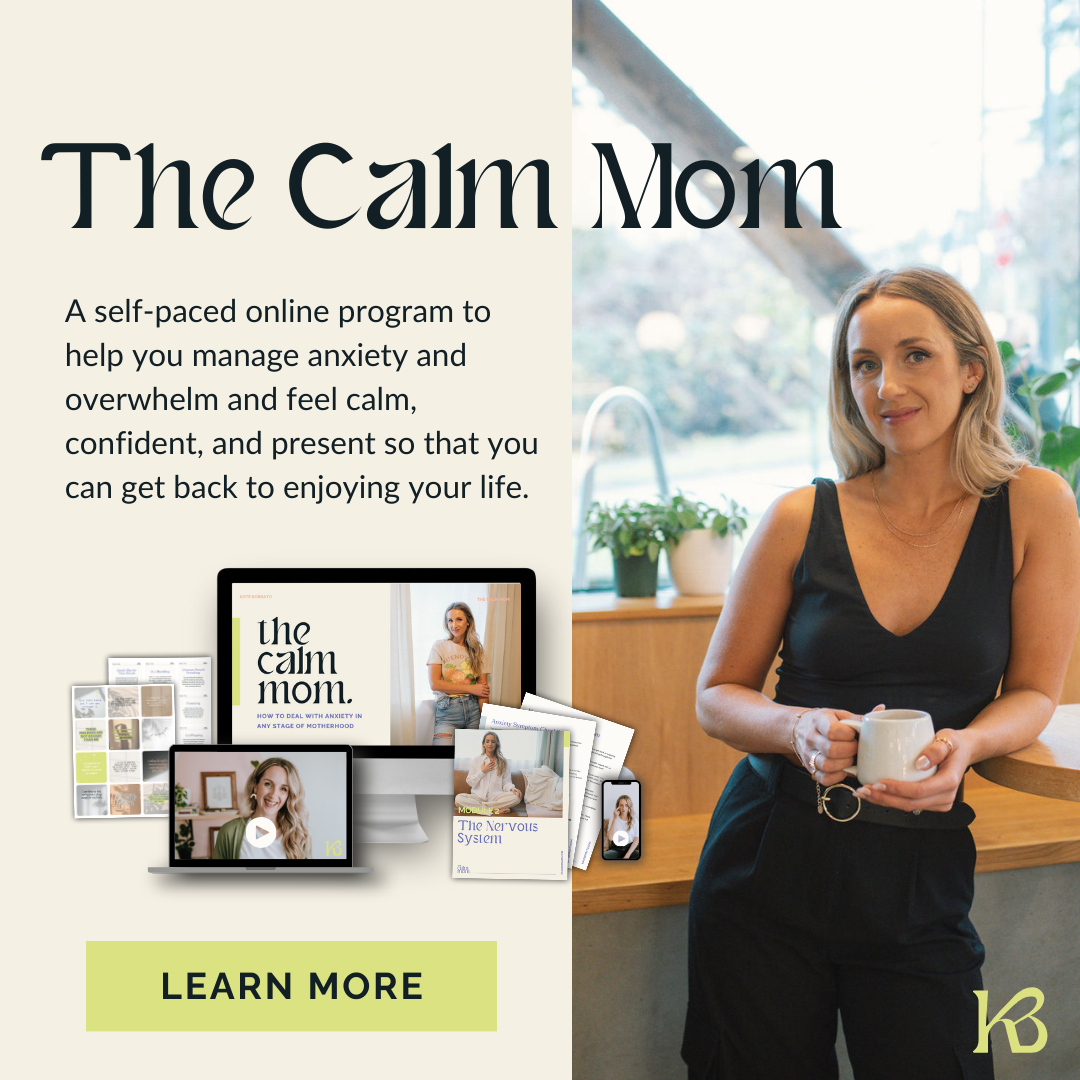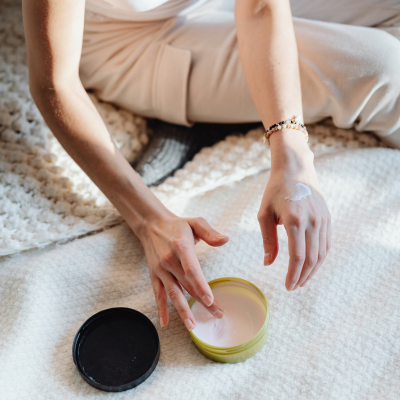Increasing your awareness and understanding of intrusive thoughts is the first step towards starting a new chapter—one where you feel calm and supported.
Intrusive thoughts can have a way of really taking away from your sense of peace and enjoyment in motherhood. These thoughts are the scary, weird, or uncomfortable ideas that pop into your mind for no apparent reason. And if you’re a new mom, you may be having this experience way more frequently than you ever did in the past. If you’re here, it might be because the content that has been entering your mind lately has been surprising or scaring you and you’d like to put your mind at ease. Maybe you’re trying to get a better understanding on how these scary thoughts work… and why they even happen to begin with.

You’re in the right place and by researching this, you’ve already taken a brave step towards healing and becoming the best parent you can possibly be. Increasing your awareness and understanding of intrusive thoughts is the first step towards starting a new chapter—one where you feel calm, supported, and not afraid of what’s going on in your mind.
If you’re reading about intrusive thoughts for the first time (or you’re still getting familiar with this concept) the best starting point is in this blog post where I give the basic 101 of what intrusive thoughts are and why they happen. For context, intrusive thoughts are scary, unwanted, gruesome, or anxiety-provoking thoughts that pop into your mind… even though you really wish they wouldn’t. They can burst into your mind unannounced and cause you to feel worried, disturbed, anxious or as though you’re losing control of the safety and wellbeing of your family.
Even though intrusive thoughts are common among new mothers, so many women suffer in silence, secretly judge themselves, or feel a whole lot of shame. That shame is one of the most common feelings that moms share but guess what? These scary thoughts don’t actually mean anything about you. Our brains can play some pretty weird tricks on us and I hope to reduce this shame by letting you know that a) intrusive thoughts can often be a symptom of anxiety b) they’re super common and c) most moms also have this experience, they just may not be completely open about it. So no, you’re not weird, there’s nothing wrong with you, and you’re not a harm to your family. And hopefully you can try to remember that these thoughts certainly aren’t premonitions.
Not all intrusive thoughts are created equal: some may seem a little kooky or strange whereas others may really cause a lot of distress. Some thoughts are even based on things that are real life stressors, like health concerns, going back to work, or worries about the future. The one thing they all have in common is that they’re unwanted and you wish you didn’t have to think about them.
An important point to consider is that having intrusive thoughts isn’t actually the issue. It’s all about how these thoughts impact you that we’re most concerned about. Do they cause stress, self-questioning, or shame? That’s something to pay attention to.
Sometimes putting words to an experience helps you feel validated and it can normalize something which can feel like a much bigger deal than it is. As you’re reading through the below five categories of intrusive thoughts (with related examples) see which ones you identify with most. Some may not be applicable to your experience but the important take-home is to recognize the different forms that intrusive thoughts may take so that you can begin to be more mindful of them as they occur in your daily life. Here are five common categories which moms experience.
1. You picture your baby or children getting injured or in an accident
Intrusive thoughts under this category often focus on your child or baby getting hurt but they could also center around the safety of you or your partner. You may be just doing normal daily tasks like cooking or going for a walk when suddenly, a really disturbing idea of physical injury just comes into your mind. This one can be especially common in the earliest days and weeks of motherhood when your baby is most vulnerable. Or, it can happen more commonly at certain times of year when perceived threats are higher. (For example, you may catch yourself fearing injuries related to winter sports or road conditions.)
What’s happening here is that you are on high alert trying to stay aware of all potential dangers that could harm your family. You’re in protection mode. Makes sense right? Here’s what intrusive thoughts under this category might sound like:
What if I drop my newborn baby?
What if the baby drowns in the bath?
What if one of us gets in a car accident?
What if my partner never makes it home from work?
What if my child drowns in the pool/at the beach this summer?
What if the neighbour’s dog attacks my son?
My family is planning a ski trip. What if someone gets hurt?
The stove is so hot. What if my child touches it while I’m not paying attention and burns herself?
2. You imagine circumstances surrounding illnesses or contamination
Guess what? We’ve lived through a pandemic and understandably, our values around health and wellness have been influenced as a result. In working as a therapist supporting mothers through these past few years, I can say with 100% certainty that health anxiety is on the rise.
This is valid. I mean, we have all been affected by COVID in one way or another. Illness and unwanted diagnoses play a much larger role in the conversations we’re having (and they take up more mental energy than ever before). That’s why parents might notice more anxiety around this topic. If this is an area of intrusive thoughts that you struggle with, you might notice yourself checking your kids’ temperatures more often, being hypervigilant about cleanliness, fretting too much about minor health symptoms, or avoiding food contamination at all costs. Here are some fairly common intrusive thoughts that I know cross parents’ minds all the time. How many sound familiar?
- What if someone in my family gets Covid?
- What if my baby gets RSV?
- This condition runs in our family. What if my child gets it?
- I heard my child cough. Could it become something serious?
- What if the doctor finds something awful and I become unable to care for my kids?
- Is my baby breathing? What if she stops breathing during the night and I don’t notice?
- I’m worried that the doctor will diagnose him with X. How would I deal with that?
3. You worry about a scenario involving sexual abuse
When I say that intrusive thoughts are not all created equal, I really mean that. Some intrusive thoughts are easier to brush off than others and sadly, one of the categories that causes the most pain for mothers is the one that deals with fears around sexual abuse.
This is a really common category of intrusive thoughts for moms though. If you’re struggling with this one, you may fear that a trusted adult could harm your child or you may notice random thoughts popping into your mind about you inappropriately touching your child or baby.
Again, this is your anxious mind assessing threats, worrying, and staying on guard. So no, you’re not weird or a monster. You’re also not alone! So many mothers worry about this stuff even if it doesn’t exactly come up in conversation at a lunch hang out. This is what intrusive thoughts in this category could sound like:
- What if I touch my baby inappropriately during bath time or diaper changes?
- Why does breastfeeding feel inappropriate?
- What if a trusted adult abuses my child and I don’t know about it?
- I had my own experiences with sexual abuse. What if the same thing happens to my kid?
4. The images that pop into your mind are violent
Intrusive thoughts often relate to your kids but really, they may focus on any member of the family. Remember, these are completely random thoughts that just show up unannounced. With thoughts relating to violence, you may notice that you’re scared of someone attacking you, your partner, your child or the whole family. That’s a pretty horrible and gruesome thing to sit with.
It can be even harder to allow these thoughts to pass when you’re imagining you being the one to cause harm to one of your loved ones. If it’s any consolation, brains are capable of doing some pretty strange things and our minds work in ways that can be just downright weird or difficult to understand. If this is an area of difficulty for you, try not to lose sight of what’s important here: these thoughts are only thoughts and they don’t indicate anything about you, your intentions, or your ability to be an amazing parent.
Here are some examples of what violent intrusive thoughts could look like:
- What if I get overwhelmed and shake or throw the baby?
- What if I drown my child in the bath?
- What if someone breaks in and assaults our family?
- What if I go shopping and a shooter attacks me?
- What if I accidentally take a kitchen knife and harm somebody?
- What if I push my kid down the stairs?
5. You worry about love, attachment, and healthy relationship building
This can be a sneaky category of intrusive thoughts. Unlike, say, imagining jumping off a balcony or throwing your child down the stairs, thoughts regarding the health of your relationships aren’t graphic so they can be more difficult to recognize as intrusive thoughts.
These thinking patterns question your ability to connect with members of your family, form healthy relationships with your children, or show that they’re loved. That can be pretty painful! The problem with these types of intrusive thoughts is that they can give power to your inner critic or cause immense amounts of shame or self esteem issues. Can you catch any of these thoughts as they arise and stop them in their tracks before that happens? Here’s what they may sound like for you:
- Do I still love my partner?
- Do my children and I have a healthy bond?
- Do I love my kids enough?
- I’m not feeling connected to my baby yet. Is something wrong?
- Did I marry the right person?
- Does my kid like me?
Intrusive thoughts can really make your experience in motherhood emotionally turbulent. This is one of those areas of motherhood that can feel like something you never saw coming and therefore didn’t prepare for. That’s fair and valid.
The most important thing to keep in mind is that these are just symptoms of anxiety and that there’s nothing you did wrong. This is a common experience in motherhood, you didn’t cause this and it’s not your fault you’re dealing with this. If you do feel as though your thoughts are severely impacting your life or creating phobias that didn’t exist before, there’s so much you can do to gain control again.
I have personally experienced intrusive thoughts in motherhood and I’ve supported so many women through this issue as well.
If you’re struggling with intrusive thoughts and want to finally figure out how to deal with them, check out my program, The Calm Mom. I teach everything you need to deal anxiety, and deep dive into managing intrusive thoughts. Click the image below to learn more.









Comments +